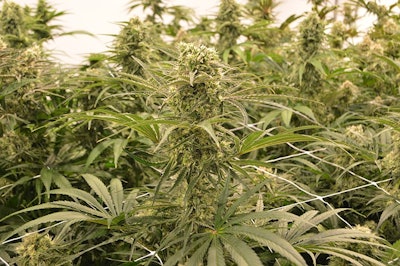
When Compassionate Cultivation found the existing selection of cannabis genetics lacking for its Texas operation, it decided to launch its own breeding project, which has produced its first unique cultivar—a high-CBD, low-THC variety called Waterloo.
Texas law allows low-THC cannabis for the treatment of intractable epilepsy, and from the beginning, Compassionate Cultivation has sought out varieties that naturally produce a 20:1 or better ratio of CBD to THC, according to Vice President of Operations Taylor Kirk. The company struggled to find reputable cultivars in the industry to select from, however, and quickly realized that it would have to improve upon the genetics available.
“We feel like we chose some of the better ones that were available at the time and started working with those, … and still work with those plants today, but it was pretty early in our operations that I realized that we could improve upon the genetics that we had acquired,” Kirk told Cannabis Business Times. “Because we started all of our plants from seed stock, we reserved the best males that we found … and have started a breeding project.”
Waterloo is the first of many cultivars that the company will breed, he added.

The variety is a cross between a male ACDC plant and a female BaOx plant, two cultivars that Compassionate Cultivation enjoyed working with early on. ACDC is a well-established CDB-rich, low-THC variety, while BaOx is technically a hemp variety, and relatively new.
“We found this mother plant that is just consistently producing some of the highest CBD content, and out of all the plants in our facility, it seems to be just a bulletproof plant,” Kirk said. “We wanted to work with that plant and improve upon it, so we took the ACDC male that we had reserved because ACDC … [is] one of the most CBD-rich medicinal plants out there, well-known in the industry.”
In creating Waterloo, Compassionate Cultivation tried to preserve ACDC’s terpene profile and the secondary cannabinoids that it produces in higher concentrations, while maintaining BaOx’s vigor, aggressive growth and high yields.
“That’s what we ended up with in Waterloo, a plant that is just some of the highest potency for us that we’ve found, as far as CBD content, and then a heavy yielder and just a joy to grow,” Kirk said.
The name Waterloo pays homage to the company’s Texas heritage—the company is Texas-owned and -operated, and wanted to release cultivars that bore Texas-themed names. Waterloo was originally the name of the state’s capital, before it was relocated to Austin.
“It’s a historical nod to Texas … [and] it’s kind of a trendy name,” Kirk said. “In Texas, there are a lot of businesses that use Waterloo, so we just thought it was a good fit for the first strain we developed in Texas.”
Waterloo’s genome has been tested by Phylos Bioscience to prove that its DNA is unique. Through this process, BaOx and ACDC were also tested, which verified their identities and further validated Waterloo’s origins.
RELATED: Phylos Bioscience Brings Transparency to Cannabis Industry Through Genetic Testing
“[Phylos] ensured that it was unique to us, no one else has this strain and that it is related to the parents that we bred it from,” Kirk said.

Compassionate Cultivation’s current finished product, a 20:1 CBD-to-THC tincture for intractable epilepsy patients, will soon include a full-spectrum extraction of Waterloo, once the plant is stabilized for production at a larger scale.
“That’s what we’re in the process of right now, and [we] should have some new products real soon to make announcements about,” Kirk said.
The company has verified that the majority of terpenes found in Waterloo are considered beneficial for reducing spasms and pain, while increasing calmness in intractable epilepsy patients.
“We’re already producing very high-quality and consistent products that have proven to be efficacious for many of the patients we serve, and this is just the next step [in] continuing that commitment in hopes that some of the patients … could benefit from the terpenes that are found in the plants,” Kirk said. “We’re hoping that [full-spectrum product] might be better for certain patients and that more research on the terpenes themselves [is] going to drive future breeding projects and selections."























